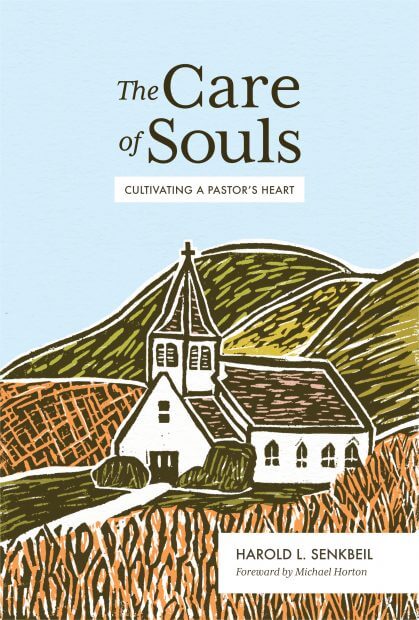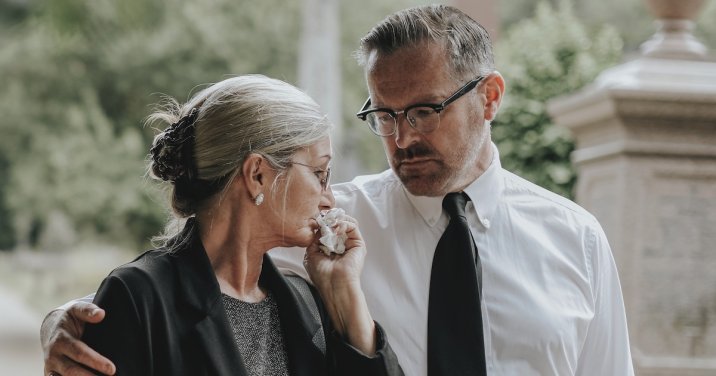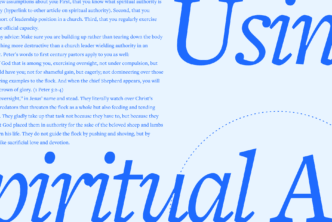Over the years I’ve developed, in good Lutheran fashion, ten theses on spiritual cure, the care of souls.
Spiritual care comes from God
My first thesis is this: All spiritual care is provided by God the Holy Trinity through his word in spoken and visible form.
You and I as pastors are not the healers; only God himself can heal sin-sick people and provide consolation and comfort to war-weary, battle-scarred, and wounded souls. We’ve been charged with the responsibility to preach publicly the life-giving word of God and dispense and administer the sacraments, which, to quote an honored tradition in the Church, are “a kind of visible word.”
The word of God effects or performs what it speaks. It does not merely describe things but creates things. So while you and I as pastors can—and should—express our personal care and concern to suffering souls sympathetically and compassionately, there is only a temporary measure of relief in our concern and compassion. Genuine and lasting healing comes from God, not from us.
It took me quite a while to learn that lesson in the ministry. I was under the false impression that my personal empathy was the main help I could bring to sorrowing or hurting people. Not only was I wrong, but I quickly ran out of empathy. I don’t know about you, but I have a limited capacity for compassion. And when I’m running on empty, I’ve got nothing left to give.
My first funeral as a pastor
The very first funeral I ever conducted was about eight months out of seminary. A middle-aged farmer died suddenly and unexpectedly. I had just visited him in the hospital that very morning; we thought he was on the mend. I went ice fishing with my father-in-law that afternoon, confident that all was well. But just after we dug a hole in the ice, his brother-in-law pulled up on a snowmobile. “Albert died,” he blurted out. My trip back to town was a whirl of emotions as I tried to remember the little I had been taught about funerals and the care of the grieving.
First up, of course, was a visit to Albert’s widow. In recent years they had already lost two grown sons tragically: One died from cancer and the other was a casualty of the Vietnam War. So I poured out my heart and soul in a valiant attempt to console Albert’s poor widow and their younger children still at home. The days following were a blur of uninterrupted emotional pain and anxiety for me as I tried to fill the family’s great gaping hole of grief and loss as best I could out of my own emotional empathy. Foolishly I tried to draw the caring and comfort out of my internal reservoir, which was rapidly running dry. Somehow I managed to hold it together during those draining days.
Albert was a well-respected citizen in our little community. We had to borrow the biggest church in town to accommodate all the mourners, and that sanctuary was jammed to the rafters. I managed to get through the service and my first funeral sermon intact, although it was extremely difficult for me since I kept trying desperately to lend that whole family my own emotional reserve, which by that time was almost nil.
In my mind’s eye, I can still see the anguish on the faces of Albert’s grieving family as they sat in the front row of the church before the pulpit. When the funeral finally came to a close, as the funeral director shut the door on the hearse, I collapsed into the arms of one of my elders standing by. I was an emotional wreck, the victim of a very common misbelief among us pastors: that people will feel better if we can somehow wrap them up in our personal strength.
God’s care is better than pastoral empathy
Over the years, I’ve found this first thesis absolutely essential in preserving my own emotional equilibrium in traumatic cases like these. I find I can enter into some pretty dicey situations without experiencing lingering stress myself so long as I am consciously aware that the help I seek to bring is quite beyond my own capacity to give. As the psalmist writes: “My help comes from the Lord, the maker of heaven and earth” (Ps 121:2).
A pastor who grasps the immense power of the word of God and who stands in quiet awe of his still, small voice need not fear tending the sheep and lambs of Christ even when they are in dire circumstances emotionally, physically, or spiritually. While he deals compassionately and lovingly with them he is also fully aware that no amount of his own love or compassion can soothe the sorrowing heart or free the burdened, tortured soul.
So when helping traumatized sheep deal with tragedy, grief, or emotional and spiritual pain, I consciously seek to tend my own soul as well by reminding myself I’m only a messenger—a messenger for Jesus. My motto becomes that of John the Baptizer: “He must increase, I must decrease.” (John 3:30) As much as possible, I want to back out of the scene and let Jesus do the heavy lifting. Armed with his word and sacraments, I can be sure that he will do the healing while I do the tending. I am the attending physician with sworn duties and responsibilities to perform. But God himself is the healer, and He—Father, Son, and Spirit—provides the healing through his word and gracious sacrament.
***

Harold Senkbeil is an Executive Director of Doxology: The Lutheran Center for Spiritual Care. His pastoral experience of nearly five decades includes parish ministry, the seminary classroom, and parachurch leadership. He is the author of numerous books, including Dying to Live: The Power of Forgiveness and Sanctification: Christ in Action.








